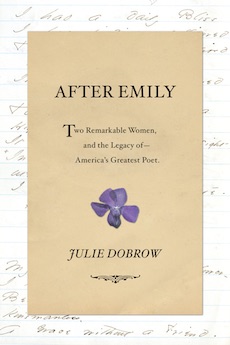By Jay M. Pasachoff
I first learned about David Peck Todd, 19th-century professor of astronomy at Amherst College, because of his work on the transit of Venus of December 6, 1882. It was re-imagined and animated before the 2004 transit (the next one visible, after the 122.5-year gap) by astronomy-historians Tony Misch and Bill Sheehan using 147 images taken at two-minute intervals at the Lick Observatory on Mt. Hamilton in California.
Then the salacious situation in which David Todd’s wife Mabel Loomis Todd, left back in Amherst, took up with Austin Dickinson came to the fore, and my interest in literature whetted by my English-Ph.D. wife Naomi Pasachoff, and the fact that Austin’s sister was Emily Dickinson brought the story to a memorable level. The 13-year extramarital affair between Mabel and Austin led to entanglements both literary and legal involving Emily’s legacy.
Julie Dobrow (ΦBK, Smith College), a Tufts University professor, has written a book ostensibly about how Mabel Loomis Todd wound up as a major figure in bringing the poetry of the reclusive and secretive Emily Dickinson to the public. After all, Emily’s poetry was first published in 1890 in a book coedited by Mabel, and the subtitle of Dobrow’s book is Two Remarkable Women and the Legacy of America’s Greatest Poet. But Naomi and I were especially interested in the glimpses of astronomy, as David was often traveling away from home on solar eclipse expeditions. Since I have been on 70 eclipse expeditions and Naomi on 42, we have picked out the astronomy from the literature-related biography.
Dobrow’s After Emily tells the fascinating story of how important Mabel was to the world’s access to Emily’s work, as she transcribed and edited the poems. It is fair to say that without Mabel, there may well have not been an Emily Dickinson. I admire how Mabel’s daughter, Millicent Todd Bingham (one more generation in a matrilineal line traced back to John and Priscilla Alden), dealt with “her tormented quest to figure out what to do with all the STUFF,” since “neither woman ever threw out a scrap of paper,” which provided a treasure trove for Dobrow’s research.
Dobrow discusses the sexual liaisons of both Mabel and David, and Mabel’s may even have been in response to David’s philandering history. So the unfaithfulness went in more than one direction: “They had an understanding about each other’s relationships, and it worked. Or at least it seemed to at the time.”
The year 1882, after the Todds moved to Amerst from Washington, was pivotal: Mabel learned of Emily’s poems, followed months later by the transit-of-Venus expedition to California. The poet had not had any poems published yet.
In late 1882, “David departed for San Jose, California, where he’d agreed to be the primary photographer at the Lick Observatory on Mt. Hamilton for the upcoming Transit of Venus, an extremely rare astronomical occurrence that happens only twice each century,” Dobrow writes. “This was David’s chance to see and photograph the event during his lifetime, and he left Amherst for two months in its pursuit. Mabel and Austin took advantage of their respective spouses’ absence….” (Susan Dickinson was at family wedding at the time.) Their mutual love letters, handwritten and preserved, as quoted in the book remind me of current scandals that involved leaked or hacked messages.
Mabel did work to advance her life in Amherst, with and without the neighbors. She “began to realize a little tangible success from her writing after she went on an astronomical expedition to Japan with David in 1887,” Dobrow reports. “Things she saw and experienced found their way into a series of articles she wrote that was published in the Nation, entitled ‘The Eclipse Expedition to Japan.’”
Astronomically, David turned out to be especially unlucky. Mabel observed in her diary: “The clearest day for weeks, until almost an hour before the eclipse. Then clouds arose in the midst…. I am so sad for David beyond words.” David remained unlucky at eclipses for a long time. For the 1914 eclipse (the same date as the 2017 Great American Eclipse, see “This Isn’t the 1st Eclipse to Occur on Aug. 21, and It Won’t Be the Last“), according to Mabel’s daughter Millicent, “just a year after her stroke, Mabel was somehow well enough to board the SS Rotterdam…en route to Russia…. My father was possessed by the pursuit of eclipses. So off we went in pursuit of that shadow to cross Russia in August, 1914.” The Todds had to return home from Russia after the outbreak of war without seeing the eclipse. Mabel did eventually write a book, Total Eclipses of the Sun. (Too bad that the author, describing daughter Millicent’s 1960 eclipse observation, didn’t clearly distinguish between that lunar eclipse and her parents’ quest to see solar ones.)
Though Dobrow doesn’t discuss how the Todds have been remembered in the heavens, I will: with asteroids 510 Mabella and 511 Davida named after them in 1903 (it was then common to feminize names for asteroids, though Mabella seems to carry adding “a” too far); David even has crater Todd on Mars’ moon Phobos.
Dobrow’s interesting book will be of interest to fans of science and of literature, not to mention those in the increasingly common field of gender and sexuality studies.
Astronomer and author Jay M. Pasachoff is the director of the Hopkins Observatory and Field Memorial Professor of Astronomy at Williams College. He is a Visitor in the Carnegie Observatories. Williams College is home to the Gamma of Massachusetts Chapter of Phi Beta Kappa.




